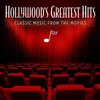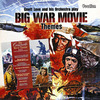Soundtrack Information

Battle of Britain
Varese Sarabande (302 066 578 2)
Year Released: 1969 / 2004
Conducted by Ron Goodwin / Sir William Walton
Format: CD
Music From
Music By
Purchase Soundtrack
Track Listing
| 1. | Battle of Britain Theme | 1:25 |
| 2. | Ace High March | 3:35 |
| 3. | The Lull Before the Storm | 1:40 |
| 4. | Work and Play | 2:30 |
| 5. | Death and Destruction | 1:26 |
| 6. | Briefing the Luftwaffe | 1:18 |
| 7. | Prelude to Battle | 3:24 |
| 8. | Victory Assured | 2:16 |
| 9. | Defeat | 1:28 |
| 10. | Hitler's Headquarters | 0:58 |
| 11. | Return to Base | 0:48 |
| 12. | Threat | 1:25 |
| 13. | Civilian Tragedy | 1:11 |
| 14. | Offensive Build-Up | 3:47 |
| 15. | Attack | 1:02 |
| 16. | Personal Tragedy | 0:47 |
| 17. | Battle in the Air | 4:54 |
| 18. | Absent Friends | 1:07 |
| 19. | Battle of Britain Theme - End Title | 2:59 |
| 20. | Introduction March and Battle of Britain March | 2:18 |
| 21. | The Young Siegfrieds | 1:24 |
| 22. | Luftwaffe Victory | 1:18 |
| 23. | The Few Fight Back | 1:53 |
| 24. | Cat and Mous | 2:54 |
| 25. | Scherzo "Gay Berlin" | 1:21 |
| 26. | Dogfight | 1:30 |
| 27. | Scramble/Battle in the Air | 5:41 |
| 28. | Finale: Battle of Britain March | 2:30 |
| Total Album Time: | 58:49 |
Related Albums

Hollywood's Greatest HitsPrimary Wave Records (509995 00609 24)
Released: September 24, 2007
Format: CD (129 min)
Review: Battle of Britain
4 / 5 Stars
In a year when one of the finest epic cantatas composed for film is rejected by no less arbitrary a force than a focus group composed of seventeen people, it's hard to believe there was a time when the final decision regarding the fate of a composer's work was placed in even fewer hands. Yet such were the forces that ultimately decided that William Walton's score for the Guy Hamilton aerial war film Battle of Britain would not be used and that Ron Goodwin would write a new score, according to the informative liner notes by Jerry McCulley for the new
Ron Goodwin of course had an excellent track record in British war films by 1969, his resume including the hit scores for 633 Squadron (1964) and the masterpiece of tension Where Eagles Dare (1968). His signature sound from those scores is instantly recognisable in the "Battle of Britain Theme", a martial piece with machine-gun like snare drums and a brass melody that seems to scream adventure in its short opening arrangement. Goodwin uses the theme as a leitmotif for the brave and the few who defended
More noticeable throughout the score is a softer theme for the English people and their way of life. First appearing in "Work and Play" for strings and woodwinds and later in "Victory Assured" and "Threat", it invariably serves as a nice break from the brass-laden battle cues. "The Lull Before the Storm" is another glimmer of soft light in a fairly restless score. On the other side of the fence, there's the bombastic theme for the Luftwaffe, a clever bit of marching band pastiche that is riddled with irony. "Ace High March" presents this theme and all its variations (note the nice counter-pointing of woodwinds with the main march motif in the second half of the track), and the theme is never far away either in the midst of battle ("Attack") or the ennui preceding it ("Briefing the Luftwaffe", "Hitler's Headquarters").
Ironically my favourite part of the film score is the cue that survived from Walton's score. Apparently at the insistence of Walton's previous collaborator Lawrence Olivier (the two had worked together on Henry V, Hamlet, and Richard III), the montage piece "
The Varese re-release of the 1999 Ryko issue of the score includes not only the final film score, but also Walton's complete rejected score of about twenty minutes length. It's a fantastic opportunity to hear premiere British composers from different era present alternative takes on the same film, and Walton's is nothing if not different to Goodwin's. His theme for the English heroes ("Battle of Britain March", "Finale: Battle of Britain March") is more a ceremonial than a march – so filled with Elgarian optimism that one can easily imagine a coronation taking place to it. (Walton scored one of those, of course!) It's the most hummable theme on this CD, but it's not too hard to see why United Artists might have felt it didn't quite suit contemporary notions of what a war film should sound like. Walton's treatment of the Luftwaffe comes off as a bit more contrived– turning Wagner's motif for Siegfried (the quintessential musical Aryan male) into a horn call for the Nazi pilots ("The Young Siegfrieds", "Dogfight", "Luftwaffe Victory") is certainly ironic, but maybe it steps a little too far in that direction, stripping the enemy of both force and menace. Maybe Walton really had been away from film scoring for too long, not having scored a film for 14 years he had devoted to the concert hall. On the other hand, moments like the jaunty dance of "Scherzo 'Gay Berlin"' and the extended "Scramble! / Battle in the Air" are an indication of what the maestro must have been like when he was the composer of choice for British war films in the early 1940s (Spitfire, 1942).
Potential purchasers should note that a handful of Goodwin's track on this release are in mono although the majority are in stereo, as on the Ryko release. As for owners of the Ryko release, they might be persuaded to fork their cash again for a vastly improved cover design. Overall, one if left with the impression that many have arrived at – that the Walton score was a better candidate for the concert hall with its bevy of subtle musical ideas, and that Goodwin (with a little help from Walton and Arnold) wrote the better score for the film. Sadly Walton never had the chance of recognition for his work, and while this latter day commercial release of his score may do him no good wherever he rests in peace, it's a credit to Varese Sarabande that they have seen fit to increase the availability of both scores again. They are fine works in the genre.
-
Click stars
to rate.
If any information appears to be missing from this page, contact us and let us know!


